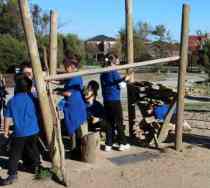 Last week I visited a school where the students can build dens freely, any time they want, during breaks between lessons. In case you were wondering, Berwick Fields Primary School in City of Casey, Victoria, Australia is not a Steiner School, or a progressive private institution. It is a state school (and a large one, with over 1,000 students on roll).
Last week I visited a school where the students can build dens freely, any time they want, during breaks between lessons. In case you were wondering, Berwick Fields Primary School in City of Casey, Victoria, Australia is not a Steiner School, or a progressive private institution. It is a state school (and a large one, with over 1,000 students on roll).
The den-building area is relatively small – perhaps ten metres by fifteen – and is on the edge of a sandy wetland (where the children can also dig ditches and make rivulets). Any child from year 2 (around 6/7 years old) upwards can take part.
My guide on the visit, environmental education teacher Adam Surmacz, said that the den-building was not an adult idea: it originated from children’s spontaneous activity. “A couple of years ago, some building work had been going on in the school grounds,” he told me. “Children started borrowing left-over construction materials like pallets and scrap timber, and using them for their own building projects.”
To its credit, the school reacted not with alarm, but with interest. Staff could see that good things were happening. Some made connections with their own childhood memories of playing in the creeks, bush and vacant lots of their neighbourhoods.
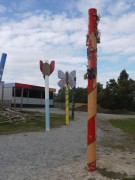 Two years on, the activity is still popular. Some vertical timber posts have been added, to aid construction (including an intriguing set of poles, decorated by each year group). The only rule is that dens have to be demolished at the end of each session. This is to allow more children to take part. Before the rule was introduced, children were starting to get territorial about their cubbies. (This rule does seem a pity, as it obviously limits the scope of the children’s ambitions. I wonder if there isn’t another solution. But with a large student population, a small area and high demand, it’s easy to see that ensuring fair access is a challenge.)
Two years on, the activity is still popular. Some vertical timber posts have been added, to aid construction (including an intriguing set of poles, decorated by each year group). The only rule is that dens have to be demolished at the end of each session. This is to allow more children to take part. Before the rule was introduced, children were starting to get territorial about their cubbies. (This rule does seem a pity, as it obviously limits the scope of the children’s ambitions. I wonder if there isn’t another solution. But with a large student population, a small area and high demand, it’s easy to see that ensuring fair access is a challenge.)
Interestingly, in Berwick Fields all the children are on break at the same time – an admirable position that allows children of different ages to cooperate on their construction projects. Many schools in the UK now have age-segregated break times, and in Australia some have age-defined playground ‘zones’ too, marked out with painted lines. This practice is often driven by anxiety about the negative influence of older children on younger ones. But it creates problems of its own, since it deprives students of different ages of the chance to learn how to get along with each other.
Principal Stephen Wigney explains that the den-building offer reflects a wider educational philosophy. For him and his team, the school’s job is not just to promote formal attainment, but to allow the children to learn and grow. “Our approach is about looking beyond academics and educating the whole child,” he told me. “It is about giving our students the chance to discover their passion – to find out what matters to them. Not everyone here will become a brain surgeon or a leading politician. But everyone needs to know what it feels like to have a sense of accomplishment.”
It is clear even from a brief visit that Berwick Fields has a strong belief in children’s abilities and capacities, and in the value of allowing students to take an active role in forging connections with what is around them. The school curriculum emphasises the importance of the environment and sustainability (it secured a Stephanie Alexander Kitchen Garden Foundation grant, for instance, and has an impressive kitchen garden and kitchen classroom).
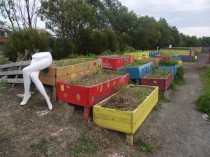 Visually, the school grounds display the kind of quirky playfulness that I associate with the best adventure playgrounds. One growing bed is adorned with the bottom half of a shop dummy, while a string of shoes and boots decorates a prominent boundary fence.
Visually, the school grounds display the kind of quirky playfulness that I associate with the best adventure playgrounds. One growing bed is adorned with the bottom half of a shop dummy, while a string of shoes and boots decorates a prominent boundary fence.
Berwick Fields may be unusual. But it is not unique. In the UK, the ‘playpods’ initiative supported by Bristol Scrapstore shows what can happen when loose parts are brought into the playground.
A similar ‘pods’ scheme is being promoted in Australia [update June 2016: this scheme is no longer active].
There is widespread concern about children’s engagement with nature, their levels of physical activity and their opportunities to learn through experimenting and taking risks. So it should be obvious that the approach of Berwick Fields is worthwhile. Yet the majority of schools take a very different view.
In many schools, play and break times are seen as a problematic part of the day. What is more, they are being squeezed. When I was in primary school, we had three break times, with an hour for lunch. Today, most UK schools have just a morning break and perhaps forty minutes at lunchtime. Robust academic research confirms this picture of declining free time in schools. A pair of studies [pdf link] by Peter Blatchford at London University’s Institute of Education shows that the time given over to breaks has fallen steadily and significantly in recent decades. In the USA, the very idea of recess is under threat.
At the same time, of course, children’s everyday freedoms in the rest of their lives have been in steady decline. Hence, their free time at school becomes even more important, since for many children it is the only chance they have to enjoy the face-to-face company of their friends and peers – and it is also a vital opportunity to learn how to deal with everyday social situations.
We can guess the reasons for this anxiety in schools – safety fears, and growing pressure to show their impact, using only narrow academic measures. So how do we move the debate on from these barriers, and promote a positive vision of children’s play in school? I would love to hear your ideas.
Note: ‘den’ is the usual British English term. Aussies call them cubbies. Americans know them as forts. We all know from our own childhood what we are talking about. The language of play crosses boundaries of space and time.
Photo credits for images of children: Adam Surmacz.
Not to be copied without permission

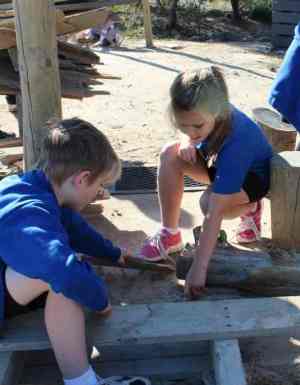
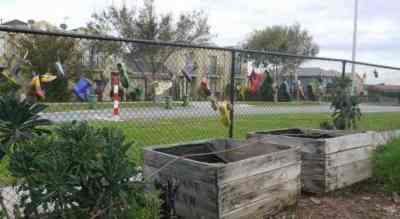
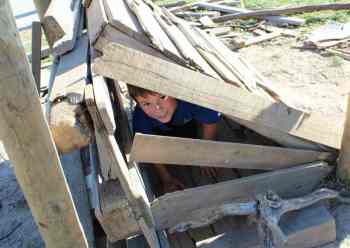

Pingback: The school where kids can build dens | Rethinking Childhood « happycityhappyschools
Reblogged this on I, me and PhDzilla.
This is great stuff, our local primary school in Bacchus Marsh is also introducing this type of playspace based on the Sydney uni model.
This looks like an inspirational school Tim. We’re really proud to see our Victorian schools getting back to the basics of natural play. Thanks for the link to the Play for Life website too. We are REALLY proud of the work we are currently doing with the Play for Life team and the reaction to our Play for Life POD project has been phenomenal … The demand is growing quicker than we can push them out at the moment, which is a VERY exciting problem to have!
Donna
Lovely blog. Archimedes have started delivering Bush Schools Training sessions in Australia which are based on the Philosphy and Ethos of Forest Schools but adapted to suit the environment and culture in Australia. Bush Schools use regular, long term programmes in natural areas for personal, social and emotional development in children and young adults as well as promoting respect for heritage and nature. It is run by professionally trained and assessed Bush Schools Practitioners who use play, bush skills such as fire lighting and wood craft in a learner led environment where the journey creates its own rewards. For more info you can visit http://www.bushschools.org.
Great to hear about schools that allow kids to build dens. My daughter went to a Norwegian school for a while and she loved to climb trees and building dens during recess.
Pingback: Outside | Pearltrees
Pingback: The school where kids can build dens | Rethinking Childhood | The Nature of Play | Scoop.it
our grandaughter attends berwick fields primary school and my wife and both think it is one of the best in australia ,i would endorse this schhool to anyone ,good luck berwick fields primary school
Wow. Small builder of today will be huge successful developers of tomorrow. This is such an inspiring and motivational post that should get us thinking about new and creative ways to make education fun.
Pingback: A Public Grammar School Where Kids Can Build Forts at Recess | My Baby
Thanks for the comments, and for the news about other positive initiatives. I get the feeling that in Australia, as in the UK, the pendulum is swinging back towards a more balanced, thoughtful approach to risk. As a result, new possibilities are emerging for children to explore, discover, imagine, learn and grow.
This was great to read about. Tim and readers, do you know of any public US schools where this kind of thing is happening?
Hi Annie – no I don’t. In fact from what I hear, in the US the very idea of recess is under attack. Hoping that if anyone reading this does know of anything, they’ll make a comment. It may also be worth contacting the Alliance for Childhood or Kaboom! who have both been campaigning around recess in the US.
I have very fond memories of building cubbies at my Melbourne primary school in the 1970s. Our school took over a vacant block that was next door to the school and this block had a row of low bushy trees that were perfect for building little houses. We all brought materials from home and spent lots of time engaged in this activity presumably until the next ‘craze’ hit the school (eg, marbles or swap cards or elastics etc) or they went ahead and developed the block. I recently went and visited the school and they have an art room and school garden in this area. Really nice but not quite as good as the freedom we had to make our own constructions back when this was just a vacant block with a row of trees.
Empressnasigoreng – thanks for this. The schoolyard den-building revival starts here!
Really this is a great, the kids are build dens. We are proud of the kids they are doing in this type of good activities and my son love the climb tree and building dens. And really this is emboldened and persuasive blog thanks for this blog.
Kids Activities
Pingback: Playground Den-Building and Kids Play DIY - Playscapes
Pingback: Playground Den-Building and Kids Play DIY | Playscapes
Pingback: Join in a global day to change the way children learn and play | Rethinking Childhood